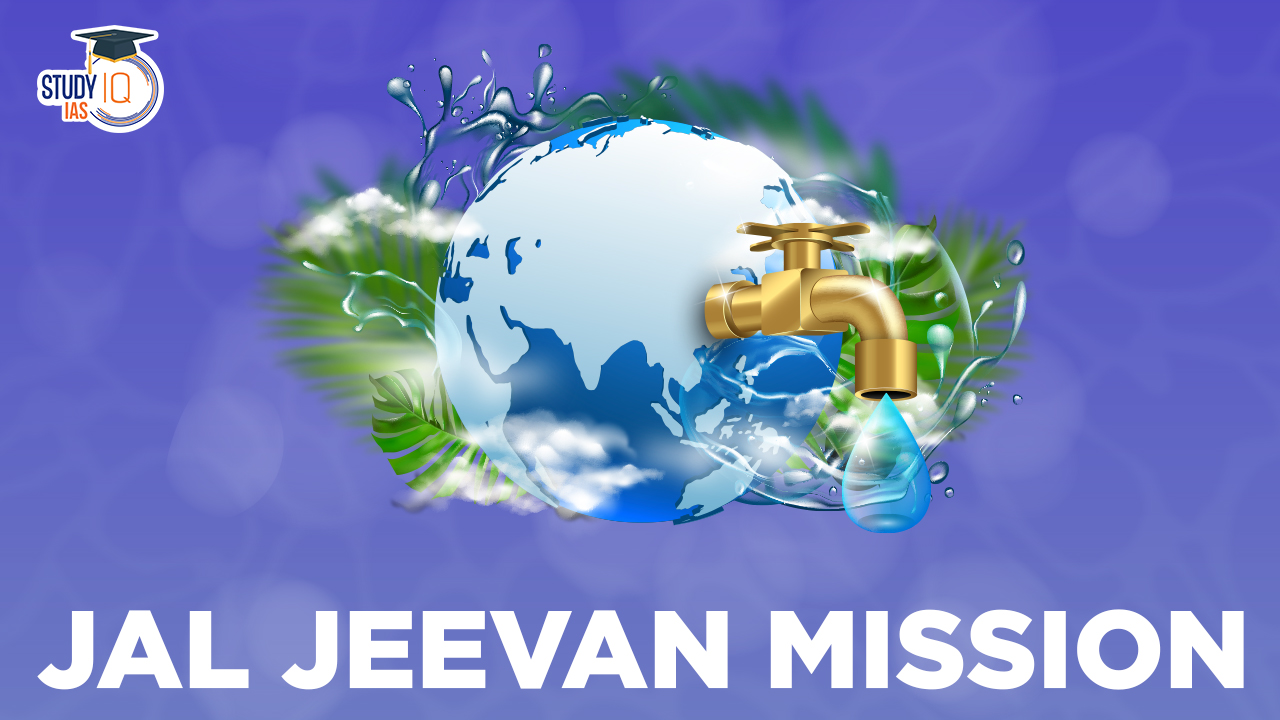Table of Contents
Context: The Expenditure Finance Committee (EFC) has halved the funding for the extended period of the Jal Jeevan Mission. There are serious concerns over inflated costs by states and contract irregularities.
About Jal Jeevan Mission (JJM)
In 2019, with the unwavering aim of making safe drinking water a reality for every Indian household, the ambitious Jal Jeevan Mission (“Har Ghar Jal” – water in every house) commenced its journey. Spearheaded by the Department of Drinking Water and Sanitation under the Jal Shakti Mantralaya, this Jal Jeevan Mission prioritises ensuring equitable access to piped water supply for all rural households by 2024.
| About Jal Jeevan Mission (JJM) | |
| Launched | It was launched on August 15, 2019, by Prime Minister Narendra Modi. |
| Implementing Ministry | Ministry of Jal Shakti. |
| Objective | To provide Functional Household Tap Connections (FHTCs) to all rural households in India by December 2024, under the “Har Ghar Jal” programme. |
| Target | 16 crore rural households to be covered. |
| Funding Pattern |
|
| Current Status (as of December 2024) |
|
Objectives of Jal Jeevan Mission
The Jal Jeevan Mission, launched in 2019 with the ambitious aim of providing “Har Ghar Jal” (water in every house), boasts a multifaceted approach to achieving its goals. Here are some of its key objectives:
Universal Access
- Functional Household Tap Connections (FHTC): The primary objective is to ensure all rural households have access to safe and adequate drinking water through functional tap connections by 2024. This involves expanding and improving existing water supply infrastructure, along with constructing new facilities where needed.
Sustainability
- Source Sustainability: The mission goes beyond just providing water connections. It emphasises ensuring long-term water security by focusing on source sustainability measures. This includes rainwater harvesting, groundwater recharge, and responsible management of water resources to prevent depletion.
Community Participation
- Gram Panchayat Ownership and Management: Jal Jeevan Mission actively promotes community ownership and management of water supply systems. This empowers Gram Panchayats to plan, implement, and maintain their own water infrastructure, fostering a sense of responsibility and accountability.
Equity and Inclusiveness
- Focus on Vulnerable Groups: The mission recognizes the need for a targeted approach to address the needs of vulnerable groups like Scheduled Tribes, Scheduled Castes, and geographically disadvantaged areas. Dedicated efforts are made to ensure these communities have equitable access to safe drinking water.
Gender Equality
- Focus on Women’s Leadership: Jal Jeevan Mission recognises the crucial role women play in managing water resources at the household level. It actively encourages women’s participation in decision-making processes and capacity-building initiatives to empower them as effective water managers.
Information and Awareness
- Public awareness and IEC: The mission emphasizes the importance of raising awareness about water conservation, hygiene practices, and sustainable water management among rural communities. This includes educational campaigns and initiatives to promote behavioural changes for responsible water use.
Monitoring and Evaluation
- Robust Monitoring System: A robust monitoring system is in place to track progress, identify gaps, and ensure effective implementation of the mission. This includes regular data collection, analysis, and reporting on key performance indicators.
Funding Sharing Pattern of Jal Jeevan Mission
- Centre and States- 50:50,
- Himalayan and North-Eastern States- 90:10.
- UTs- the Central government provides 100% funding.
Benefits Of The Jal Jeevan Mission
- Reduced infant mortality: Studies estimate a potential 25% decrease in under-five deaths (1,36,000 annually) and a 30% reduction in infant deaths due to access to clean water.
- Improved health: 4 lakh diarrhoeal deaths can be prevented with nationwide tap water coverage.
- Economic savings: Up to $101 billion or ₹8.37 lakh crore can be saved through reduced health costs and increased productivity.
Empowering Communities
- Women’s involvement: Active participation in decision-making through village water and sanitation committees (Pani Samitis).
- Youth skill development: Training programs for local water management and maintenance.
- Community ownership: The Nal Jal Mitra initiative equips villagers with repair and maintenance skills.
Employment Generation
- Estimated creation of 59.93 lakh direct and 2.22 crore indirect jobs during the construction phase.
- An additional 11.18 lakh direct jobs annually for operation and maintenance.
We’re now on WhatsApp. Click to Join
| Expenditure Finance Committee (EFC) |
|


 List of Military Exercises of India 2026...
List of Military Exercises of India 2026...
 Mukhyamantri Majhi Ladki Bahin Yojana, O...
Mukhyamantri Majhi Ladki Bahin Yojana, O...
 PM MITRA Parks, Objectives, Key Features...
PM MITRA Parks, Objectives, Key Features...

























